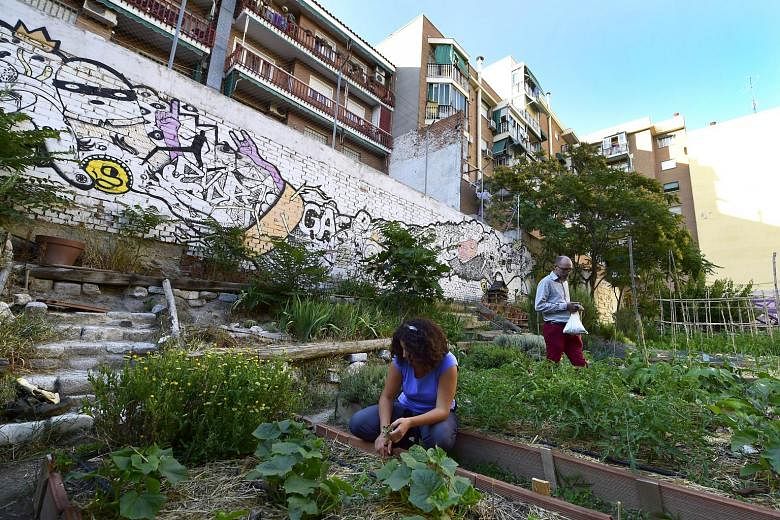MADRID • Five years ago, during Spain's housing boom, Mr Felix Jumbo worked as a builder. Now, he digs for pumpkins and cabbages in a district where the construction cranes once swung.
Like millions of people in Spain, the 51-year-old Ecuadorian lost his job. But he keeps busy in one of thousands of "social allotments" that sprang up during the crisis.
"For me and for a lot of people, this is a kind of therapy. It helps us forget about being unemployed," he said at the kitchen garden in the working-class Adelfas neighbourhood of Madrid.
As a builder "I earned a lot of money, up to €3,000 (S$4,500) a month," he said. But he has not found work since 2010.
So, he and dozens of neighbours took over a patch of land near a railway, surrounded by housing blocks built during the construction bubble that burst in 2008.
They ran a long hosepipe from across the street, set up sprinklers, and began planting beans, lettuce, cabbages, tomatoes and pumpkins.
"Little by little, we went from one vegetable patch to two, three, four. Now we have 16," Mr Jumbo said.
Spain's construction bust threw millions out of work and into poverty - but it also left countless empty plots of ground where building sites were abandoned.
"What are they doing with those plots of land that were once intended for housing blocks? They are making urban gardens," said Mr Gregorio Ballesteros, an expert from the Spanish Organic Agriculture Society.
There were about 2,500 such urban gardens across Spain in 2006 before the crisis.
The number has surged to more than 15,000 in 200 towns and cities, said Mr Ballesteros.
"In Spain, many of the vegetable gardens are near railway lines, in places where the ownership of the land is not clear," he said.
This kind of kitchen garden became common in the United States and northern Europe in the late 19th century, at the height of the Industrial Revolution.
They are "historically linked" to times of economic and social crisis and war, but nowadays are also a means of sustainable organic food production, Mr Ballesteros said.
In Spain "we are a hundred years behind. We are still light years away from other countries".
Some of the patches are publicly funded, such as ones in impoverished Andalusia, whose regional government helped set them up for poor families.
Barcelona is now formally authorising plots that had been taken over illegally, Mr Ballesteros said.
Elsewhere, plots have been set up by private initiatives such as Juan Tomate, a group running social allotments for the homeless.
At a homeless shelter run by the Catholic order of San Juan de Dios in Madrid, Mr Victoriano Castellanos stands in a straw hat among peppers, tomatoes and cucumbers.
"This is a way of being reborn," said Mr Castellanos, 59. "You have come back from the dead."
The produce of this garden, set up a year ago, gets cooked in the kitchen of the shelter. Among the residents are long-term homeless people as well as recent arrivals, including even lawyers and businesspeople who have fallen on hard times, said the shelter's director, Mr Juan Antonio Diego.
Mr Victor Noguera, 62, a sociologist by training, lived in various countries before winding up jobless back in Madrid. He arrived at the shelter recently and picked up a hoe.
"Feeling like a corpse as far as the job market is concerned is very hard to take," he said. "This helps you feel more psychologically balanced."
AGENCE FRANCE-PRESSE

